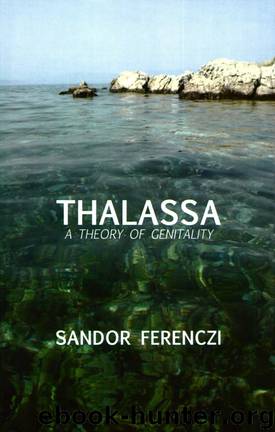Thalassa: A Theory of Genitality (Maresfield Library) by Sandor Ferenczi

Author:Sandor Ferenczi [Ferenczi, Sandor]
Language: eng
Format: azw3
Publisher: Karnac Books
Published: 1989-12-31T05:00:00+00:00
CHAPTER 8
COITUS AND FERTILIZATION
If according to our hypothesis coitus is naught else than the freeing of the individual from burdensome tension, simultaneous with the gratification of the impulse towards regression to the maternal womb and to that prototype of everything maternal, the sea, it is not so readily apparent why and in what way this gratificatory impulse, seemingly quite independent as it is of the impulse to fertilization and the preservation of the species, nevertheless coalesces with the latter and achieves expression simultaneous therewith in the genitality of the higher animals. The one point which we have so far been able to adduce in explanation of this state of things was the individual’s identification of his total personality with the genital secretion. In this light the elaborate safeguarding with which the individual surrounds the genital secretion would not be any more curious than similar safeguarding measures which so many animals employ in the case of their other excretions also. It is the feeling of the individual that these excretions constitute an essential part of his very self, are part and parcel of him; arid their discharge is accompanied by a feeling of loss which seems to be more intense in the case of solid matter (faeces) than upon the elimination of excretions of a thinner consistency.
This explanation, however, strikes one from the outset as quite inadequate and unsatisfying, particularly when one takes into consideration the fact that with the sexual act there are brought into temporal and spatial conjunction both the depositing of the sexual secretion in a place of safety and the process of fertilization, that is, the union of gametes of opposite sex and the inception of embryonic development. It must be conceded that the act of fertilization poses riddles of a character quite different from those with the solution of which we were concerned in connection with the act of coitus. For in truth fertilization is a far more archaic phenomenon than the temporary union of male and female in the sex act. We have seen, in fact, that the development of genitality and of its executive organ has its earliest inception in the amphibians, but propagation by fertilization, on the other hand, in the lowest unicellular organisms, in the amoeba. This suggests the exact reversing of the line of thought pursued up to the present, and the inquiry whether those zoologists are not right who maintain that the sexual act in toto is simply a compulsion induced as it were by the sex cells which forces the individual to bring the germ cells together in the safest possible situation. The manifold precautions which are taken to this end in the animal kingdom even prior to the development of the function of sexual intercourse speak definitely in favor of this assumption, and the question is thereby raised whether this is not likely to upset our whole hypothesis of uterine and thalassal regression.
The sole means of escape from this difficulty lies in the consistent following through of the idea of the perigenetic parallel.
Download
This site does not store any files on its server. We only index and link to content provided by other sites. Please contact the content providers to delete copyright contents if any and email us, we'll remove relevant links or contents immediately.
Rewire Your Anxious Brain by Catherine M. Pittman(18643)
Talking to Strangers by Malcolm Gladwell(13347)
The Art of Thinking Clearly by Rolf Dobelli(10454)
Mindhunter: Inside the FBI's Elite Serial Crime Unit by John E. Douglas & Mark Olshaker(9322)
Becoming Supernatural by Dr. Joe Dispenza(8200)
Change Your Questions, Change Your Life by Marilee Adams(7759)
Nudge - Improving Decisions about Health, Wealth, and Happiness by Thaler Sunstein(7692)
The Road Less Traveled by M. Scott Peck(7594)
The Lost Art of Listening by Michael P. Nichols(7494)
Mastermind: How to Think Like Sherlock Holmes by Maria Konnikova(7323)
Enlightenment Now: The Case for Reason, Science, Humanism, and Progress by Steven Pinker(7306)
Win Bigly by Scott Adams(7184)
The Way of Zen by Alan W. Watts(6601)
Daring Greatly by Brene Brown(6502)
Big Magic: Creative Living Beyond Fear by Elizabeth Gilbert(5755)
Grit by Angela Duckworth(5604)
Ego Is the Enemy by Ryan Holiday(5414)
Men In Love by Nancy Friday(5234)
The Laws of Human Nature by Robert Greene(5172)
